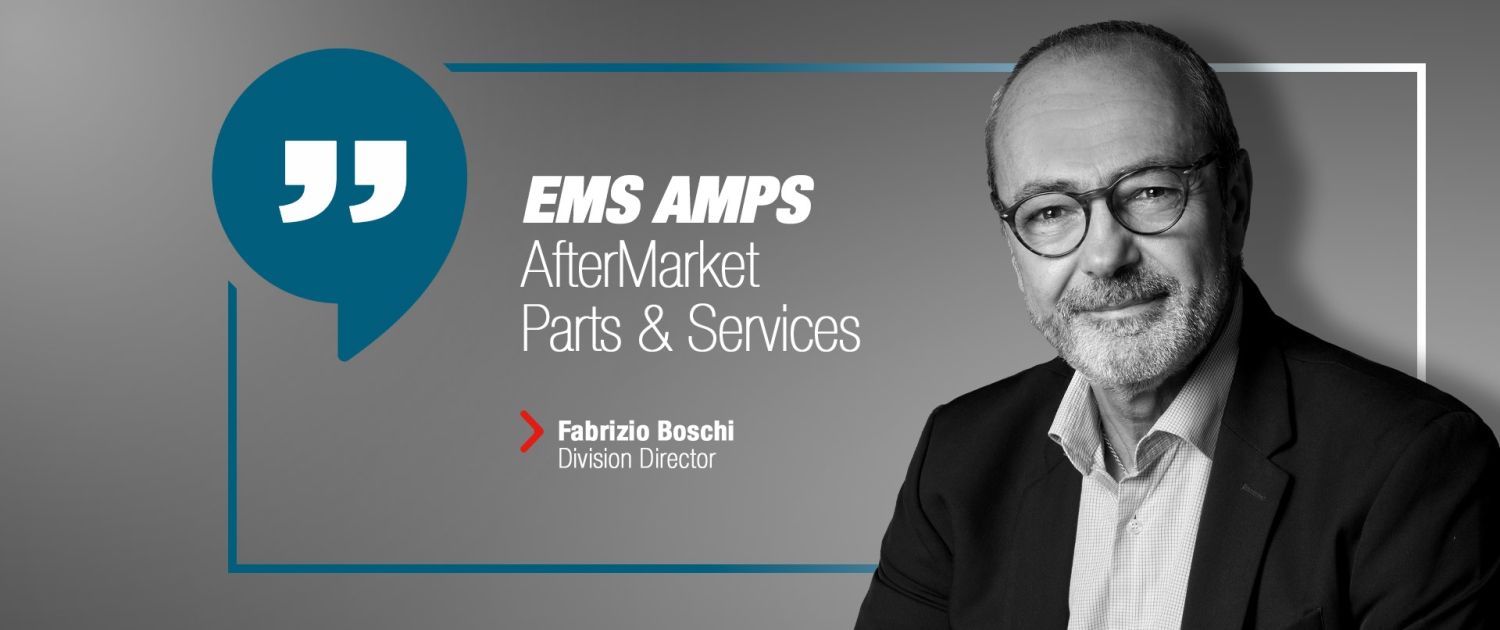EMS AfterMarket Parts & Services
AfterMarket Parts & Services is the EMS Group business unit dedicated to after-sales services:
we discuss it with Fabrizio Boschi, the division Director.
Providing excellent customer service is essential to ensure the efficiency and performance of the systems supplied over time and to meet any needs that may arise during the system life cycle, strengthening our relationship with the customer.
For this reason, AfterMarket Parts & Services (AMPS) was created in 2021, EMS Group’s service company fully dedicated to providing cutting-edge after-sales services.
We talked about it with the Director: Fabrizio Boschi.
EMS Group invests in enhancing customer service via the creation of AMPS, a dedicated business unit. What are the division’s objectives?
AfterMarket Parts & Services was created to offer customers an excellent after-sales service, in tune with the evolution of industrial automation systems.
The last 10-15 years have seen a remarkable evolution of electronics and robotics in system construction. This has led customers to turn to structured partners to obtain an efficient after-sales service, able to support them in managing the various cases that occur during the life cycle of the machines.
What services does AMPS provide?
After Market Parts & Services manages the following activities:
- Support 24/7 on a global level.
- Spare parts supply.
- Formulation of maintenance plans.
- Training.
- Modifications, upgrades and relocation of existing systems.
Let’s talk about support: what methods are available?
The support plans can be configured according to the customer’s production needs.
A few examples:
- 8 hours a day, 5 days a week.
- 8 hours a day, 7 days a week.
- Support 24/7, crucial for companies that operate on 3 shifts.
The remote support service is also available: when starting up a system, we also provide our customers with remote diagnostics hardware and software. These tools allow us to view exactly what the operator sees at the plant and to provide them with all the information they require, significantly reducing machine downtime in case of need and also providing the option to carry out additional virtual training. For example the service – free for the first months of operation – has proved extremely effective during the most critical stages of the pandemic.
How did you organize yourselves to provide support on a global level?
AMPS is located at our main headquarters in Montecchio Emilia. This is where the requests arrive, which are handled all over the world by means of an international network of support points, connected to a central server containing the information needed to provide a targeted and efficient service.
Our service hubs, in rotation, undergo training/refresher courses to always keep up to date with how systems are evolving.
Maintenance is one of the most crucial services to guarantee a performing and long-lasting system. AMPS has several scheduled and preventive maintenance plans available, what is the difference?
Scheduled maintenance consists in a periodic analysis of the state of health of the machine and it is agreed according to the company’s production needs.
Preventive maintenance, on the other hand, is used to monitor the potential wear of certain parts of the systems in order to prevent faults or downtime. Based on some data – for example, the hours of use – we are able to notify the customer in advance of the need for certain interventions.
EMS Group is implementing a third type of maintenance, the predictive kind. What does it consist of?
Predictive maintenance involves the installation of software components and applications on machinery, designed to monitor, collect and analyze certain mechanical and physical parameters of the machine as well as the life cycle of the components installed.
A concrete example is vibration monitoring: if this parameter exceeds a certain level defined as normal, an alert warns of abnormal machine operation.
Another example is the monitoring of the life cycle of mechanical and electro-mechanical components installed such as gearmotors, bearings, encoders, etc. In this case, as the end of the life cycle approaches, an alert also warns that the components involved must be replaced to prevent potential downtime.
All our support services can be configured via a secure software that connects the machines to our systems, in order to allow systems to communicate directly with our service company.
How are spare parts managed?
Our division has an independent spare parts warehouse that ensures availability of the most critical components.
Upon delivery of the system, AMPS provides a list of recommended spare parts, which includes the crucial components and those with an extended availability time.
EMS Group also provided customers with the interactive spare parts catalog: this software enables to virtually navigate a three-dimensional version of your system and to identify its components, even the smallest ones. The customer is able to identify the pieces desired and easily and quickly generate a quote if needed.
Training those in charge of running the systems is a crucial service, how does AMPS provide it?
First level training is provided to make operators understand the actual operation of the machines. Furthermore, certain essential procedures are simulated during first level training, for example the correct recovery and start-up procedure following machine downtime.
Second level training consists in a more advanced type of training, as operators are taught how to interact with the machines and manage their various parameters.
Lastly, let’s talk about system upgrades.
Drawing on a wealth of engineering expertise, we develop and offer customized solutions for modifications, upgrades, revamping and relocation of existing systems in order to improve performance to cater to any need that may arise during the systems’ life cycle.



